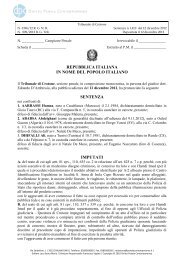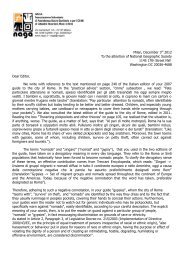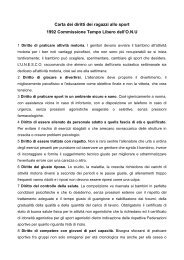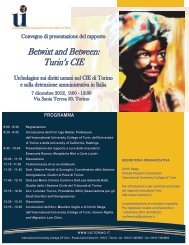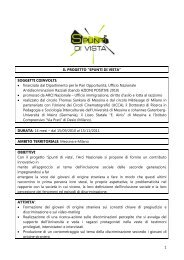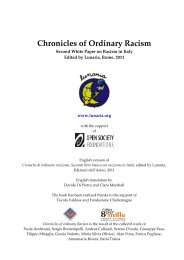Chronicles of ordinary racism 2011 - Cronache di ordinario razzismo
Chronicles of ordinary racism 2011 - Cronache di ordinario razzismo
Chronicles of ordinary racism 2011 - Cronache di ordinario razzismo
- No tags were found...
Create successful ePaper yourself
Turn your PDF publications into a flip-book with our unique Google optimized e-Paper software.
The municipality <strong>of</strong> Brescia, not well‐pleased (just consider the amount <strong>of</strong> public money<br />
involved in these trials…), backed a standard lower court ruling (ex art. 669 octies c.p.c.)<br />
in the hope <strong>of</strong> having the case referred to an ‘administrative’ judge (as opposed to an<br />
‘<strong>or<strong>di</strong>nary</strong>’ one), and filed an appeal to determine legal juris<strong>di</strong>ction before the Court <strong>of</strong><br />
Cassation (supreme court).<br />
But, the Sezioni Unite (appeals <strong>di</strong>vision) <strong>of</strong> this court stated that “the transparency <strong>of</strong><br />
extant legislation does not admit any doubt as to the juris<strong>di</strong>ction <strong>of</strong> the ‘<strong>or<strong>di</strong>nary</strong>’ judge<br />
over matters concerning the protection against actions and behaviour that contravene<br />
the principle <strong>of</strong> equality” 197<br />
Therefore, the juris<strong>di</strong>ction <strong>of</strong> the ‘<strong>or<strong>di</strong>nary</strong>’ judge having received <strong>of</strong>ficial confirmation,<br />
we can but wait for the continuation <strong>of</strong> the trial in Court, which is, unfortunately, taking<br />
a long time to get underway.<br />
The baby bonus as established by the municipality <strong>of</strong> Tradate<br />
Another episode to make the headlines was the subsidy for newborns instituted by the<br />
Municipality <strong>of</strong> Tradate, unusual inasmuch as it represents a case <strong>of</strong> “<strong>di</strong>scrimination<br />
against foreigners” but also, concurrently, <strong>of</strong> “<strong>di</strong>scrimination on the grounds <strong>of</strong> ethnic<br />
or racial identity and descent” as defined by national and international legislation.<br />
The peculiarity <strong>of</strong> the bonus in question (unique, in this respect, in the field <strong>of</strong> municipal<br />
regulations) 198 was the inclusion <strong>of</strong> the Italian citizenship <strong>of</strong> “both parents” as a requisite.<br />
This entailed two obvious consequences: a) a number <strong>of</strong> Italian children were also<br />
excluded from the subsidy in view <strong>of</strong> alleged “ethnic” attributes owing to the <strong>di</strong>fferent<br />
nationality <strong>of</strong> one <strong>of</strong> the parents; b) a “financial <strong>di</strong>sincentive” to the union <strong>of</strong> mixed<br />
couples was introduced by guaranteeing a greater degree <strong>of</strong> financial support to those<br />
who married a fellow countryman than to those who chose a foreign national as their<br />
partner.<br />
This inevitable outcome found resoun<strong>di</strong>ng and unforeseen confirmation in the<br />
elucidations appended to the decree, stated in the lower court ruling. In an attempt to<br />
justify the decision to limit the bonus to children with two Italian parents, the local<br />
council claimed that the subsidy was rooted in Europe’s demographic decline,<br />
intrinsically linked to “the death <strong>of</strong> in<strong>di</strong>vidual cultures” and that it had stemmed from<br />
considerations surroun<strong>di</strong>ng “the future <strong>of</strong> European culture as firmly linked to<br />
European populations” and it therefore represented a “special incentive towards<br />
cultural conservation”.<br />
A Milan Court, in the course <strong>of</strong> the trial and on appeal, ascertained and asserted the<br />
<strong>di</strong>scriminatory nature <strong>of</strong> Tradate’s conduct and requested an amendment <strong>of</strong> the<br />
municipal ruling. Moreover, in the course <strong>of</strong> the appeal hearing the court ordered that<br />
4) Court <strong>of</strong> Brescia, ord 27 May 2009, pres. est. Tropeano.<br />
In http://www.asgi.it/public/parser_download/save/brescia._bb_27maggio09.pdf .<br />
197 Supreme Court, Appeals Division, 15 February <strong>2011</strong>, n. 3670. This ruling confirms that the anti-<strong>di</strong>scrimination<br />
ju<strong>di</strong>cial action under art. 44 <strong>of</strong> decree n. 286/98 was identified by the legislator as a prototype in the legal battle<br />
against <strong>di</strong>scrimination, to be applied whenever the act in question is contested as <strong>di</strong>scriminatory, regardless <strong>of</strong><br />
whether said <strong>di</strong>scrimination was carried out by private parties or public administration and therefore whether<br />
involves legal positions defined as subjective rights or legitimate interests. See:<br />
http://www.asgi.it/public/parser_download/save/cassazione_sentenza_3670_11_1502<strong>2011</strong>.pdf.<br />
198 With the possible exception <strong>of</strong> subsidy instituted by the Municipality <strong>of</strong> Adro establishing a “baby bonus”<br />
reserved for children with both parents in possession <strong>of</strong> EU citizenship. Cf. footnote 1.<br />
79




